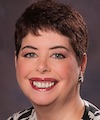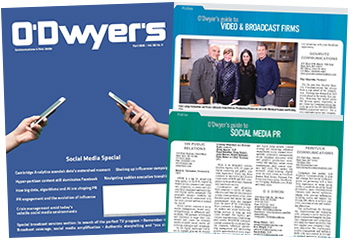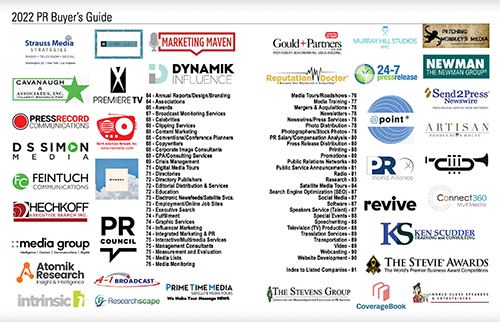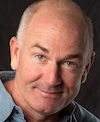 Wendy Meyeroff |
Since I started providing expert editorial materials to clients more than 20 years ago, I’ve seen a lot of changes. There are more TV options. There’s the Web. There are blogs and YouTube. Need I go on?
Sitting in an audio broadcast host chair — first over three years ago and now co-anchor of “Partners in Health & Biz” — I started asking over and over: why shouldn’t any reliable expert take advantage of what can be the much lower-cost — and often more believable — publicity option: radio guesting?
The numbers still show how valuable a marketing tool this is. Yet I regularly get insights as to how few folks truly recognize, let alone use, this venue. I write about this because yes, I’ve been hosting/chatting on Podcasts, but that lets me trade appearances with radio hosts!
|
|
The numbers are there
This February, Nielsen re-emphasized that it’s radio Americans use: 93 percent tune into AM/FM compared to “[watching] television, or [using] smartphones, tablets or computers.”
The strength remains past expected spikes. Of course, radio had strong listening trends during the 2016 election and the first year of the Trump term, but Nielsen found audience numbers are still solid; from 7.4 percent of listeners ages 25-54 in both ’16 and ’17 to 8.3 percent this past January.
Another stat: Holiday listeners didn’t dissipate this past quarter. One example showed the Adult Contemporary market stayed great across the board; e.g., whereas listeners ages 18-34 were at 7.2 percent in January 2017, this January the segment was 8.0 percent, according to Nielsen.
My insights were enhanced when I suggested (then hosted) a panel called (wait for it) “Don’t Forget Radio!” for the American Society of Journalists and Authors a few years ago. Folks piled into this seminar and while we didn’t do an official survey (probably should have) this seemed to be a solid audience mix of current self-help authors, their ghosts and agents, plus many looking to get their “amazing book” on the market.
One of my panelists, Dan Smith, CEO/Founder of Smith Publicity in NJ, talked about the challenge of aligning fiction authors. His experience created this motto: “No One Interviews a Book!” In other words, “very few radio shows discuss an actual book.” Instead, he and his team make sure they tie the novel to a real-life event.
Another expert, Janet Appel of NYC’s Janet Appel Public Relations, noted, “We encourage authors to build a following on local radio shows because … you may be one of the few experts [in the area],” and she meant geographic area. Need a PTSD recovery expert in NYC or Boston? They’re easy to find. Seeking someone who’s working locally with kids and families in the Parkville after that shooting (e.g. psychiatrists, social workers, bereavement counselors, even principals.)? Somewhere in there may be a current or would-be author, perhaps someone already being pitched by publishers to write a first-person story. (Bet you can imagine a book by one of the #MarchForOurLives movement’s beacons, Emma Gonzalez.)
Think beyond the obviously dramatic
I get ghostwriting options from several sources, but probably my longest connection is what comes through the Editorial Freelancers Association. I don’t remember too many ghosting gigs in the ’90s, but from what I’ve seen in the last decade they’ve exploded. Fiction, non-fiction; bios and biz advice; health gurus…every type of editorial request comes through and most concepts don’t sound as dramatic as Parkville or 9/11.
That doesn’t mean they won’t work. It’s just means truly understanding your target. I remember one of Dan’s stories and I hope I have the details right. It went along the lines of he’d booked the author of some biz insights to a small Iowa town’s station. The author protested. After all, how important could a small-town audience anywhere be? Of course, Dan’s savvy convinced his client and what happened? Some type of venture money supplier in that small town hooked up with the author!
Check out options
Get an eBook written to promote. I’m working on my own Small Biz Savvy eBook that offers shorts insights on “Marketing on a Shoestring” the subtitle to my previous broadcast, “Piggy Bank Promotions.” Or it could be a real book, like one of the first I helped promote: The Family Caregiver’s Guide, sponsored by a home health aide manufacturer whose marketing savvy was growing. Just remember: you still need a story idea, not just a commercial. (That’s called “advertising!”)
Contact by using the requested method. Sometimes when I desperately needed a guest on my original Piggy Bank Promotions show (usually only after an emergency) I left my phone number to ensure immediate contact. But that was very rare. Instead I posted only my email.
Nevertheless, folks who figured their expertise was so educated/fun/inspirational ... you get the idea … were sure I’d be thankful they called. Folks, don’t assume any host will love a long chat as you pitch “amazing” insights. Some have lots of work to do.
Pick a specific topic. I got too many calls with totally generic pitches, like, “We can talk about social media.” Yeah, so? Which aspect of social media … and what makes yours different? You can talk plastic surgery. Again … so what? A health show is more likely to book someone who knows specifics like: “I can tell your listeners the breast surgery mistakes I most often have to repair after someone else made them — and how to avoid those mistakes.”
By the way, when conducting research on possible guest spots, make sure a show features related topics. If it’s a stock market program, a gastrointestinal expert is usually not the first guest needed. (Unless execs are getting ulcers from all the ups/downs.)
Prepare a backgrounder. I always sent upcoming guests an email reminding them of the show’s date and call-in info, but I also asked for a bio — two or three sentences — and a few questions they’d like me to ask. If a program doesn’t allow the latter, send an FAQ sheet showing more about what you usually cover. Hosts may end up using some, or at least spark some ideas in their minds about what to discuss. See how Partners in Health & Biz gets folks involved here.
Don’t bail out! Once an appearance date has been set, keep it. You never know when a show’s audience will get bigger. (Oprah didn’t start as a megastar.) Piggy Bank Promotions grew by 300 percent after I launched it, especially in the Baltimore/DC corridor.
The bottom line: Aside from a few megastars, no one should expect radio (or any venue) to automatically roll in clients/customers. Still, this great promotional outlet should be re-explored.
***
Wendy J. Meyeroff is owner and president of WM Medical Communications and has been providing copywriting, custom content and marketing consults to health clients for 20+ years. See www.wmmedcomm.com and www.issuu.com/wmmedwriter. She can be contacted at [email protected].




 SaaS platforms now allow businesses to effectively manage and execute their own PR campaigns, putting pressure on agencies to demonstrate the value of the “traditional” PR model.
SaaS platforms now allow businesses to effectively manage and execute their own PR campaigns, putting pressure on agencies to demonstrate the value of the “traditional” PR model. Developing a well-designed TV campaign involves asking three important questions.
Developing a well-designed TV campaign involves asking three important questions. How a "Covid silver lining" can show the way to more effective, cost-efficient video communications.
How a "Covid silver lining" can show the way to more effective, cost-efficient video communications.


 Have a comment? Send it to
Have a comment? Send it to 
No comments have been submitted for this story yet.